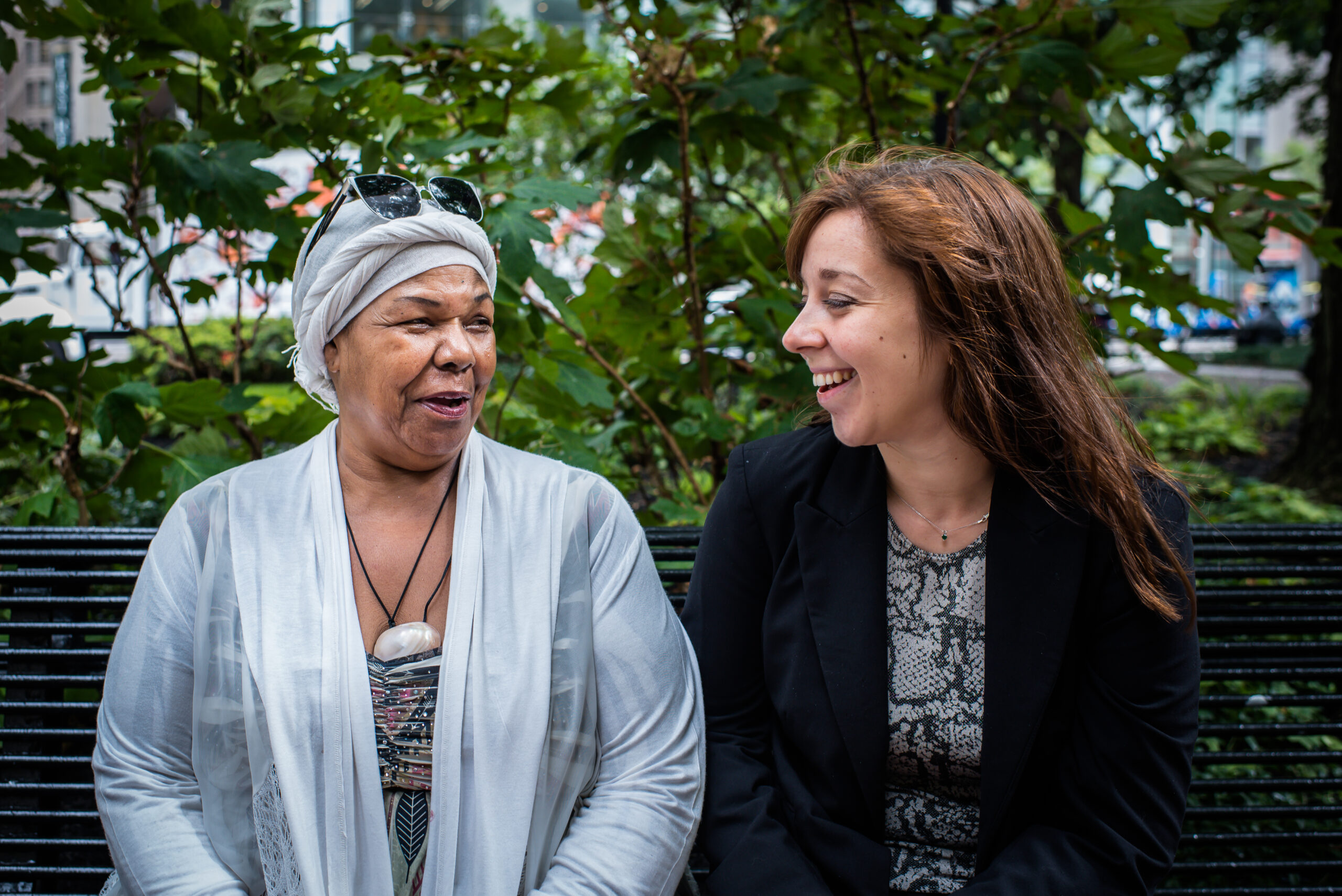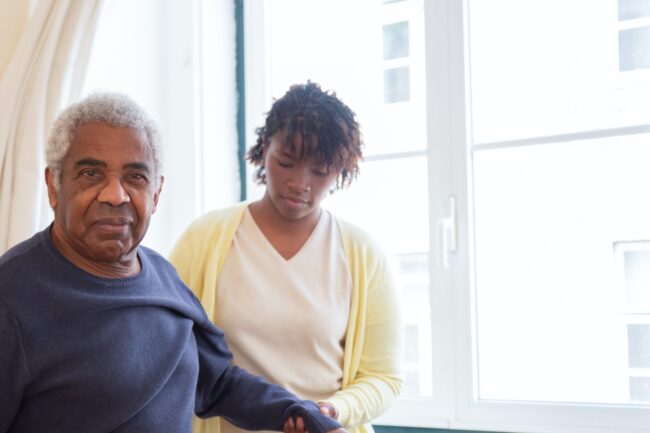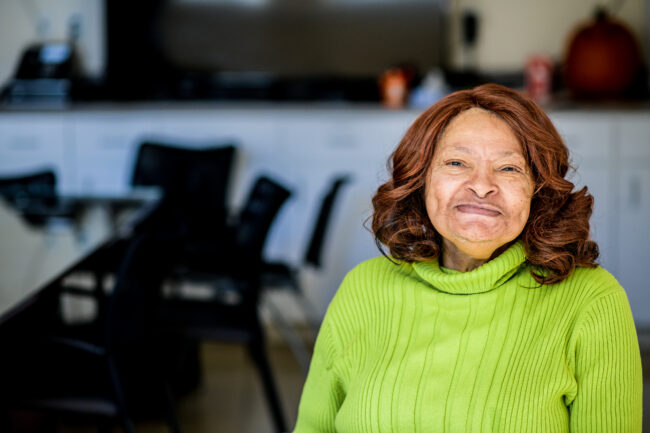Health Coverage and Care for Caregivers
Caregivers are often overlooked and undervalued in our society – we’re working to change that.
Every day, millions of people in communities across the country provide unpaid care for those living with chronic diseases, disabilities, or for many people – both. Family caregivers are doing critical work in our communities, providing lifesaving care, and allow people with disabilities, older adults, and their families to lead full lives – this is especially critical as care is harder to find than ever.
In the U.S. alone, over 53 million people identify as family caregivers, and The Centers for Disease Control and Prevention project that the need for family caregivers will only grow. The ratio of family caregivers to older adult is currently seven to one, but it is estimated that by 2030 there will be only four potential family caregivers per older adult. Despite the growing need for caregivers, the long-term support services they provide are often overlooked and undervalued.
But providing unpaid care still has a cost, one that falls on family caregivers. Research shows that caregiving often takes an emotional, physical, and financial toll. Family caregivers’ finances are often negatively impacted, with 40% having to reduce their working hours and 20% having to quit their jobs entirely to provide care. When it comes to health, 40% of family caregivers report increases in their stress levels, many experience increased anxiety, depression, or other mental health issues, and 55% of caregivers say that they don’t go the doctor as often as they should, often skipping doctor appointments for themselves to manage caregiving responsibilities.
Family caregivers are our grandchildren, mothers, neighbors, and teachers, and they are all doing more than just providing care; they are part of the glue that is holding families, communities, and our health care system together.
But for caregivers to be able to care for others, they need care themselves. That’s why Community Catalyst is working with states to improve support for family caregivers, particularly in rural communities where affordability and access are critical issues.
“I like to say that there are only four kinds of people in the world – those who have been caregivers, those who are currently caregivers, those who will be caregivers and those who will need caregivers.”
RAISE National Strategy
From Community Catalyst’s years of experience working with a dynamic network of partners across the country to foster connections, improve systems, and bring community-led and person-centered health innovation concepts to life, we have heavily invested in family caregiving work, with key findings from our community engagement listening sessions going on to directly inform the creation of the RAISE National Strategy to Support Family Caregivers (National Strategy).
Currently serving as a framework for leading work aimed at creating additional resources and improving systems to fully support family caregivers in their health, well-being, and financial security, The National Strategy includes almost 500 recommendations for actions that can be implemented at every level of government and across the public and private sector.
Using the National Strategy as a roadmap, this chapter of our family caregiving work is grounded in storytelling, strategic partnership, education, and power building to ensure greater recognition, support, and inclusion of family caregivers in policy and practice-level changes.

Improving Systems to Support Family Caregivers
Through a multistate network with Caregiver Coalition of Northeast Florida, Georgians for a Healthy Future, Idaho Caregiver Alliance, Maine People’s Resource Center, Massachusetts Healthy Aging Collaborative, New Mexico Caregiver Coalition, Oklahoma Caregiver Coalition (OK Cares), Liberty Resources, and the TN Caregiver Coalition, across ten states, we are identifying best practices, pinpointing areas for systemic improvement, and expanding on successful support strategies. Funded by the Administration for Community Living, and in partnership with the LeadingAge LTSS Center @UMass Boston, Community Catalyst and our partners will develop, test, and disseminate new approaches for supporting family caregivers using the National Strategy as a roadmap.
Our work will address Goal 1 of the National Strategy by advancing policy and practice-level changes in nine states to:
- Increase education around family caregiving issues and;
- Increase engagement of family caregivers in decision-making.
Family caregivers are an essential pillar in our health care system and our work is just the beginning of the cross-pollination of successful engagement strategies and programs between communities to create system-wide solutions. Together, through education, empowerment, and strategic collaboration, we are changing how our country supports family caregivers nationwide.
Get Involved
If you or someone you know is currently, or was previously, providing daily living assistance to someone living with a chronic health condition, disability, or both – we want to hear from you!
Help us build a more powerful movement for health justice and share your story today.
This family caregiving work is supported by the Administration for Community Living (ACL) and the U.S. Department of Health and Human Services (HHS) as part of a financial assistance award totaling $5,333,332 with 75% funded by ACL and HHS and $1,333,332 amount and 25% funded by non-government sources. The contents are those of the author(s) and do not necessarily represent the official views of, nor an endorsement by, ACL, HHS, or the U.S. Government.
Learn more about the movement to support care workers in the Medicaid coverage gap.
Learn more about the movement to support care workers in the Medicaid coverage gap. (Opens in new tab)Resources

Building the Next Generation of Family Caregiver Leaders
Profiles in Caregiving: Nancy Giurato

The Future of Long-Term Service and Supports: A Look at Massachusetts
American Rescue Plan Act
